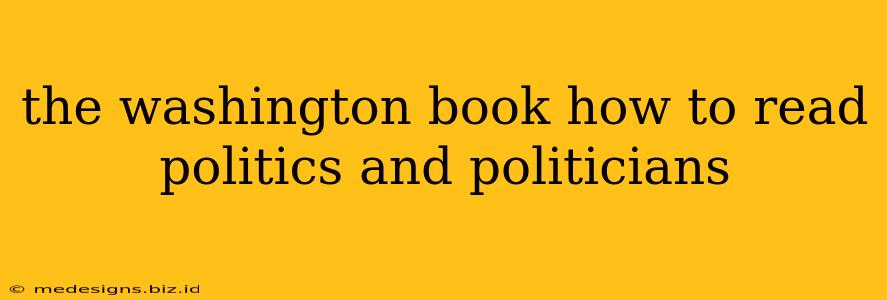Politics. It's a messy, complicated, and often frustrating game. But understanding the rules—both the written and unwritten ones—is key to navigating the world of Washington D.C. and deciphering the actions of politicians. This guide, inspired by the wisdom found within "The Washington Book," will equip you with the tools to become a more informed and engaged citizen.
Understanding the Washington Landscape
Before you can effectively read politics and politicians, you need to understand the environment in which they operate. This involves understanding several key factors:
1. The Power Dynamics:
- The Branches of Government: A fundamental understanding of the legislative (Congress), executive (President and Cabinet), and judicial (Supreme Court) branches is crucial. Knowing how these branches interact and sometimes clash is paramount to understanding political maneuvering.
- The Committee System: Congress operates through committees, which wield significant power over legislation. Understanding which committees control which areas of policy is essential.
- Lobbying and Special Interests: The influence of lobbyists and special interest groups is a significant force in Washington. Learning to identify their impact on policy decisions is vital.
2. The Media Landscape:
- News Sources: The media plays a crucial role in shaping public opinion. It's important to be discerning about your news sources, seeking out diverse perspectives and verifying information from multiple reputable sources.
- Spin and Messaging: Politicians and their staffs are masters of spin. Learning to identify biased language and identify the underlying message is a key skill for navigating the political landscape.
- The 24-Hour News Cycle: The constant flow of information can be overwhelming. Learning to filter information and focus on significant developments is important to avoid information overload and misinformation.
Deciphering Political Rhetoric
Politicians are skilled communicators, often employing rhetoric to persuade and influence. Understanding these techniques is essential to understanding their true intentions.
1. Identifying Bias and Propaganda:
- Loaded Language: Pay attention to emotionally charged words and phrases used to sway opinions.
- Straw Man Arguments: Be aware of arguments that misrepresent an opponent's position to make it easier to attack.
- Appeal to Emotion: Recognize when politicians use fear, anger, or hope to manipulate audiences.
2. Reading Between the Lines:
- Body Language: Nonverbal cues can often reveal more than words.
- Unstated Assumptions: Identify the underlying assumptions and beliefs driving a politician's statements.
- Context is Key: Understand the historical and political context surrounding a statement or action.
Becoming an Informed Citizen
Ultimately, the goal of understanding Washington politics is to become a more informed and engaged citizen. This involves:
- Active Participation: Engage in civic activities such as voting, contacting your representatives, and participating in political discussions.
- Critical Thinking: Develop strong critical thinking skills to analyze information and form your own opinions.
- Continuous Learning: Stay informed about current events and political developments through multiple reliable sources.
By developing a keen understanding of the power dynamics, media landscape, and the art of political rhetoric, you can navigate the complexities of Washington and engage more effectively in the democratic process. This isn't about becoming a political expert overnight, but about becoming a more informed and active participant in shaping your own future. The journey to becoming a truly informed citizen starts with a commitment to critical thinking and a willingness to delve deeper into the world of politics. Remember, your voice matters.
